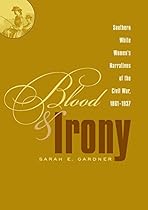Blood and Irony: Southern White Women's Narratives of the Civil War, 1861-1937

| Author | : | |
| Rating | : | 4.84 (557 Votes) |
| Asin | : | 0807828181 |
| Format Type | : | paperback |
| Number of Pages | : | 352 Pages |
| Publish Date | : | 2014-11-10 |
| Language | : | English |
DESCRIPTION:
"A very readable account of the Southern female writers who for decades after the Civil War entertained American readers." -- Washington TimesGardner not only adds substantially to our understanding of the writers, the period, and the 'lost cause' creation, but also elucidates the process by which an historical imagination develops and changes over decades. (Peggy Whitman Prenshaw, Louisiana State University) -- Review
"A Masterful Work" according to Clifton C. Hawkins. This is among the best academic books ever written. Although its subject--Southern white women's depictions of the Confederacy--might seem unpromising, Gardner brilliantly uses her topic as a springboard to discuss universal themes. These include the meanings of history and memory; the relative merits of historical fiction, history, and biography; how writers obtain authority; the ways in which groups of people
Only in the aftermath of defeat did a more unified vision of the southern cause emerge. Yet Gardner reveals the existence of a strong community of Confederate women who were conscious of their shared effort to define a new and compelling vision of the southern war experience.In demonstrating the influence of this vision, Gardner highlights the role of the written word in defining a new cultural identity for the postbellum South.. Combining varied historical and literary sources, Sarah Gardner argues that women served as guardians of the collective memory of the war and helped define and reshape southern identity. But this truth varied according to historical circumstance and the course of the conflict. In fiction, biographies, private papers, educational texts, historical writings, and through the work of the United Daughters of the Confederacy, southern white women sought to tell and preserve what they considered to be the truth about the war. Gardner considers such well-known authors as Caroline Gordon, Ellen Glasgow, and Margaret Mitchell and also recovers works by lesser-known writers such as Mary Ann Cruse, Mary Noailles Murfree, and Varina Davis. During the Civil War, its devastating aftermath, and the decades following, many southern white women turned to writing
